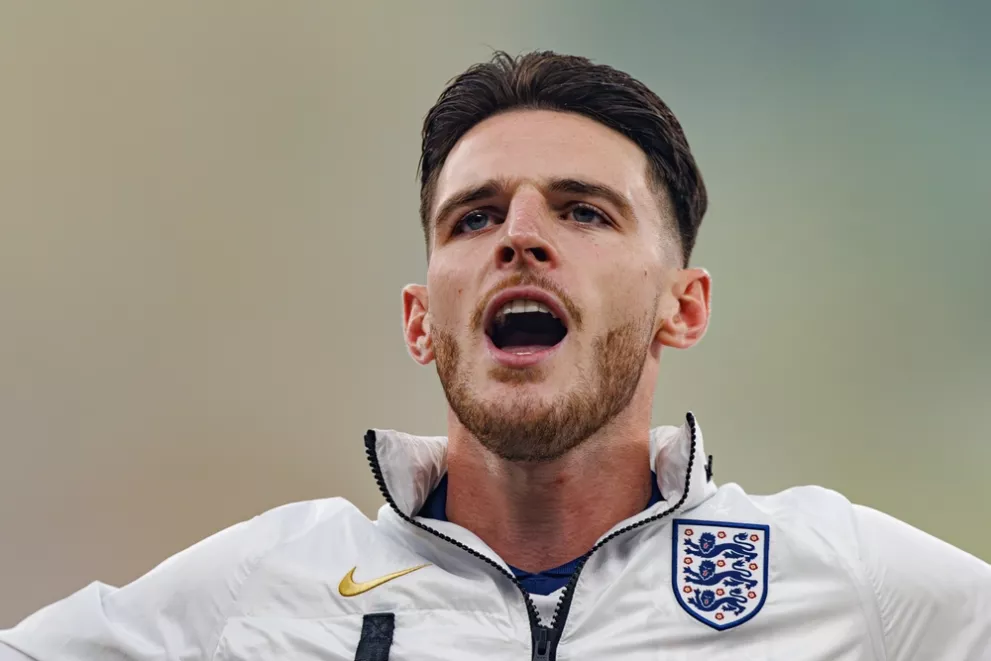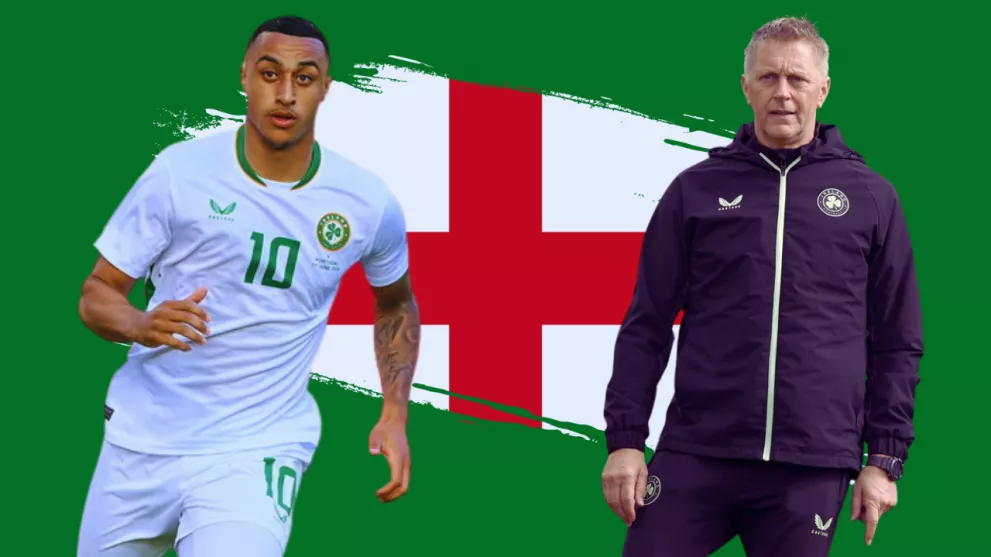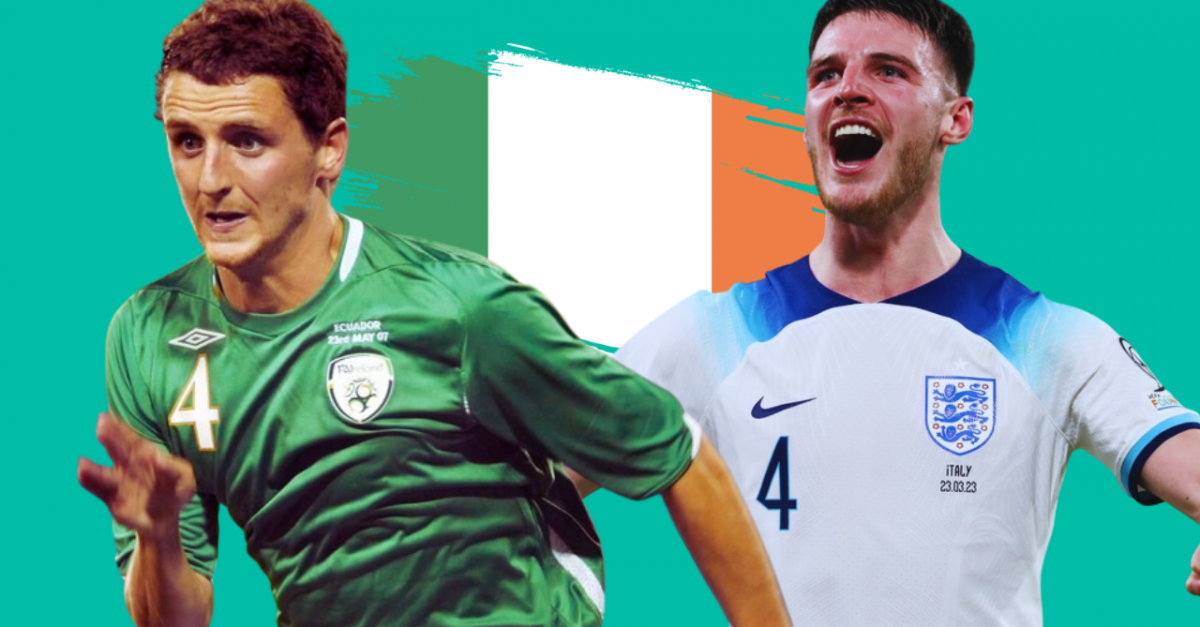An unheralded event in the modern history of Irish football is set to occur on Saturday evening – a previous Ireland international will face off against the Boys in Green for another country.
The rights and wrongs of Declan Rice’s defection to England are well established at this stage and have been a talking point for both coaches and players alike in the Irish camp this week.
The Arsenal midfielder will almost certainly start for the Three Lions at the Aviva Stadium on Saturday evening, the same ground where he made his third and final senior appearance for Ireland in 2018.
Rice will be the first former Ireland player in over a century to go on to play against the country but, in reality, it is exceedingly rare for anyone in the history of Irish football to go on to represent another country.
In fact, there are only four names on the list as of 2024. And, with Rice returning this Saturday, what better time to take a trip down through the history books.
READ HERE: Where Are They Now? The Ireland Team From Declan Rice’s Last Game In Green
READ HERE: Seamus Coleman Takes Cheeky Pop At Rice And Grealish Ahead Of England Clash
The four Irish internationals to have played for another country
Declan Rice (Ireland 2018, England 2019-present)

Declan Rice sings God Save The King before the EURO 2024 final (Photo: Shutterstock)
Unrivalled as the most controversial and noteworthy entry on this list, Declan Rice played three senior internationals for Ireland in 2018, under Martin O’Neill. Crucially, however, none of those games were competitive internationals.
His final cap (and only cap on “home” soil) came in a friendly against the USA in June 2018 and he was notoriously missing from any of that autumn’s Nations League campaign.
By the time the UEFA EURO 2020 qualifiers got underway the following year, London-born Rice was wearing an England jersey. He announced in February 2019 that he was switching allegiances, and he made his England debut the following month.
Rice has become a popular pantomime villain for Irish fans in the years since, with his reversal highly controversial in the years ever since (well, on Irish soil, anyway).
Martin O’Neill has often been blamed for his reluctance to call the 19-year-old up for any competitive games before his defection, while Rice himself has been criticised roundly by disgruntled Irish fans for the perceived shallowness and hypocrisy of his passion while playing in an Ireland shirt.
On Saturday, he will become only the second player in history to play against Ireland having previously played for the team – but more on that later…
Alex Bruce (Ireland 2007-08, Northern Ireland 2013-14)

19 November 2008; Alex Bruce, 19, Republic of Ireland, makes his way on as a substitute for team-mate Paul McShane. International Friendly, Republic of Ireland v Poland, Croke Park, Dublin. Picture credit: Brendan Moran / SPORTSFILE
A far less contentious one here.
Son of Manchester United legend Steve Bruce (himself eligible to play for Ireland during his career), Alex was eligible for both the Republic of Ireland and Northern Ireland through his County Down-born grandmother.
Bruce made his debut for Ireland against Ecuador in 2007, in the tail-end of the disastrous Steve Staunton era. He would win a second cap the following year under Giovanni Trapattoni, who even reportedly recommended to Italian side Fiorentina that they should sign him.
That may have been a false indication of confidence, however, as Bruce would not win another cap for the Republic of Ireland.
Instead, he switched allegiances in 2011, having only appeared in friendly matches for the Republic. It would be another two years before Bruce won a cap for Northern Ireland, appearing against Malta. He would win only one further cap.
He remains the only player of the modern era to appear at senior level for both Irish national teams. Which, I suppose, is the perfect point for an honourable mention…
Honourable mentions
We’ve decided to exclude any players who lined out for any combination of the various Irish national teams before FIFA’s 1950 declaration that players would not be allowed to hold dual nationality between North and South.
There was a period before that 1950 declaration when players would swap with somewhat regular freedom between IFA-affiliated and Free State-affiliated national teams. Among those players, Manchester United legend Johnny Carey was undoubtedly the most notorious.
Another honourable mention goes to another man in the England camp this weekend. Though much of the hullabaloo surrounding the pair would have you believe that Jack Grealish’s circumstances are similar to Declan Rice’s, Grealish never lined out for Ireland at senior level, playing only up to U21 level.
Cecil Moore (Ireland 1949, USA 1953)
A controversial addition here, as Cecil Moore lined out for the team that would become Northern Ireland in the late 1940s. This was during the feud between the two associations which would become the IFA and FAI and the time of dual internationals.
Though we excluded those who represented any combination of the North and South, we have made an exception for Moore for his further-afield combination.
Outdoing Alex Bruce’s two caps each for Ireland and Northern Ireland, Cecil Moore earned only one cap for each of his national teams.
Born in Belfast, goalkeeper Cecil Moore won a single cap for the Irish national team in 1949, against Wales in
He would later move to the United States to represent the New York Americans, becoming eligible for the US national team. His only appearance for the USMNT was a 6-3 defeat to England in New York’s Polo Grounds. Among the English players that day were Tom Finney, Nat Lofthouse, and Alf Ramsey.
Jack Reynolds (Ireland 1890-91, England 1892-1897)
Until Declan Rice’s debut against the Czech Republic in 2019, Jack Reynolds was the only player in history to line out at senior level for both Ireland and England.
Born in Blackburn as John Reynolds, he won three FA Cup medals in five years during the 1890s, for both West Bromwich Albion and Aston Villa. He would also appear for Celtic later in the 1890s, though a Hoops archive suggests that “Baldy” Reynold’s best days were past him by the time he arrived in Glasgow.
Reynolds moved to Ireland in the late 1890s, during his time in the British Army, and began playing football for Ulster, Distillery, and the East Lancashire Regiment team. During this time, he was capped at senior level for Ireland.
He also holds a record which will likely never be broken – he is the only man in history to score both for and against England. In one of his five caps for Ireland, Reynolds scored Ireland’s only goal in a hefty 9-1 defeat. After his return to England to line out for West Brom, Reynolds switched to representing the country of his birth, scoring two goals across eight caps.
Reynolds did play against Ireland, though he did not score against them. Rice will join him on Saturday in playing against Ireland having previously played his football in a green jersey.
Multiple sources suggest that Reynolds lived something of a playboy lifestyle to go with his exceptional ability on a football pitch (the same Celtic source as above suggested that he once disappeared from Celtic duties after binge drinking for a week). He would sadly pass away at the age of just 48, alone in a Sheffield boarding house.
A report in the Sheffield Daily Independent upon his untimely death in March 1917 described Reynolds as “one of the greatest footballers in the country.”
SEE ALSO: The Youthful Ireland Team Heimir Hallgrimsson Should Pick v England


